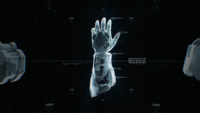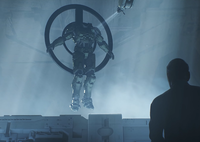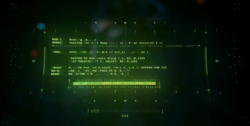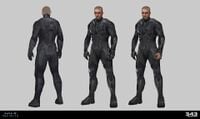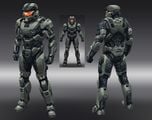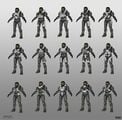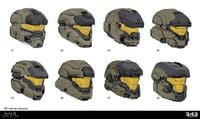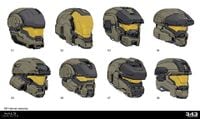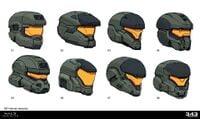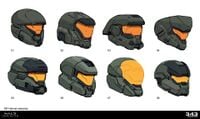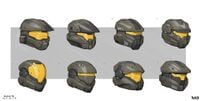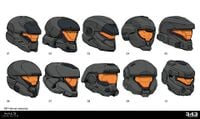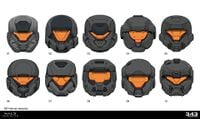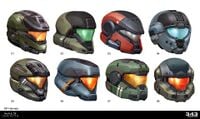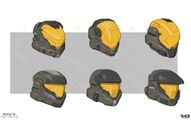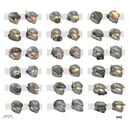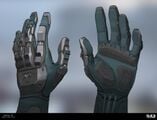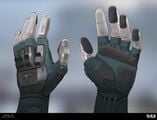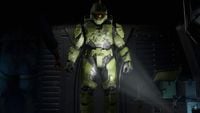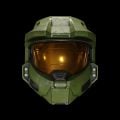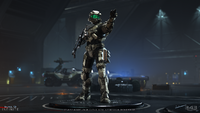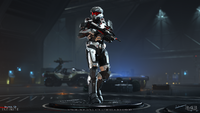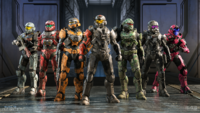MJOLNIR Powered Assault Armor [GEN3]
From Halopedia, the Halo wiki
| MJOLNIR Powered Assault Armor (GEN3) | |
|---|---|
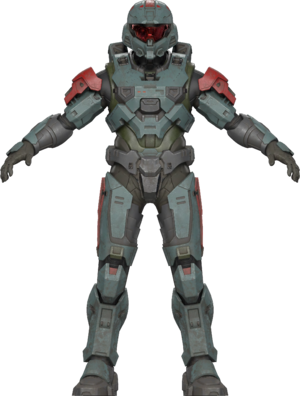
| |
| Production overview | |
|
Type: |
|
| Technical specifications | |
|
Feature(s): |
|
The MJOLNIR Powered Assault Armor [GEN3] is the third system-wide generation of the MJOLNIR Powered Assault Armor.[3] As of 2560, Generation 3 MJOLNIR has been adopted by nearly all active Spartans serving in the United Nations Space Command.[4]
Design details
Design and features
The conceptual design framework incorporates lessons from the MJOLNIR [GEN2] line of Mjolnir, while also using performance and higher levels of protection given by the MJOLNIR [GEN1] line of Mjolnir.[3] Subsequently GEN3 weighs twice as much as GEN2 at 400 kilograms.[5]
The armor features a survival mode that can keep the occupant alive for at least six months in the vacuum of space with no food, water, or other things vital to life aside from the suit's oxygen supply. After a burst of power was used by Fernando Esparza to bring John-117's armor out of survival mode, the armor's fusion reactor almost instantly recharged Echo 216's depleted batteries in return, restoring functioning to the Pelican's internal lights and systems.[6] John later told the Weapon that the next thing that he remembered after getting thrown into space was waking up on the Pelican six months later, suggesting that he had been kept unconscious by the armor for the entire time.[7] The GEN3 Mark VII armor, even in a damaged and failing state, combined with his augmentations, kept Spartan Tomas Horvath from dying of exposure when he was comatose for a day on a mountainside.[8] After Horvath was impaled and severely wounded by an alloy shard between his intestines and spleen, his biomonitors kept him in a semicomatose state while the armor's medical systems regenerated his torn insides, and the armor kept him alive until he could hunt for food using its emergency high-calorie nutrient supplements.[9]
Unique to the GEN3 variant of the Mark VI armor, John-117's armor contained holographic emitters in the palm of the hand, allowing him to display an avatar of the Weapon over his hand, a feature not previously seen with his GEN1 and GEN2 suits while he was working with Cortana. The Weapon was able to transfer herself directly into systems by having her hologram walk off of the armor's hand and into the terminal in question.[2]
John-117's armor displayed the ability to remotely link to the systems of Echo 216 and then activate the ship's autopilot at his request to fly to a chosen destination.[10]
It was possible for the users to effect field repairs by removing and reconfiguring some of the plating to compensate for the damage, but the sheer weight of each piece and the complexity of the process was a severe limitation without the right equipment.[11]
It contained a distress beacon capable of signaling UNSC forces in range.[12]
Development history
Although the MJOLNIR Powered Assault Armor (GEN2) meant a radical simplification of the Mjolnir platform, to the point it could be mass-produced, some in the Spartan Operations branch were dissatisfied with its minimal performance improvement over the old GEN1 systems. By that reason, the UNSC decided to manufacture the next generation of Mjolnir armors.[13]
Around October 17, 2558,[14] the Mark VII was used as the testbed for the GEN3 improvements, but it remained uncertain if manufacturers would adopt the standards and cost accounting by the Unified Earth Government.[3]
On February 10, 2559, four months after the rise of Cortana and the Created, the Materials Group began to manufacture GEN3 armor.[1] The Swords of Sanghelios have also become involved in the manufacture of some material for the GEN3 platform, such as the Anubis-class helmet, which is "grown" within Sangheili assembly forges.[15] While not strictly part of the GEN3 platform, the GEN1 Mark V[B] platform and its variants have been refit to be roughly equivalent to newest generation. Though this technology dates back to the Covenant War, it has been fully reconditioned and upgraded with newer and more optimized components, giving life to older technology at an integral time, and offering a new generation of Spartans the opportunity to take to the battlefield outfitted in the same style of armor that some of their own heroes once donned.[16][15]
On October 7, 2559, John-117 and Blue Team were deployed on a covert mission to CASTLE Base using the GEN3 Mark VI armor.[5] During a subsequent battle in New Mohács, Spartan IVs in GEN3 were deployed by drop pod.[17] Several months later on May 28, 2560, the armor was used by John-117 during a conflict on Installation 07.[18][2]
In the wake of the Created uprising, there were certain places where the GEN3 armor wasn't, or simply couldn't have been, rolled out. As a result, the GEN3 Mjolnir had yet to see full implementation in the Spartan branch, with some Spartans still using the GEN2 Mjolnir by late 2559.[19][20]
Armor variants and upgrades
Variants
The following is a list of major variants of the GEN3 platform.
|
|
Upgrades
The following is a list of armor accessories and modules compatible with GEN3 platform.
Attachments
The armor system is built to support a variety of attachments and equipment which increases the level of combat effectiveness. Some of them have been reverse-engineered from Covenant technology.
- Active camouflage
- Grappleshot
- Overshield
- Quantum Translocator
- Repulsor
- Shroud Screen
- Threat Sensor
- Thrusters
Armor components
- PANSPEC Energy shielding: A protective barrier that surrounds the armor and protects the user from harm.[1] This energy shield was designed by Henry Glassman and Catherine Halsey, and was based on Watershed Division's latest iteration of shaped-energy shield. This type of shielding is unique to John-117's armor.[21]
- Project JULIA Compact fusion reactor: Designed by Naoto Technologies[21], this experimental fusion reactor is the most essential part of the MJOLNIR system, as it provides power to all equipment on the armor—the reactor is built into the suit and allows for nearly unlimited movement.[1]
- Magnetic weapon holder strips: The MJOLNIR armor features very small, yet powerful magnets placed on the legs, waist, and back of the suit that are used to hold any equipment or any weapons with a magnetic property.[1]
- MJOLNIR GEN3 BIOS[1] The next-gen V12.22.12 BIOS was created by Doctor Halsey's hand-coded branch of the Materials Group's firmware.[21]
- Waterfall VISR[21]
- Force-multiplying circuits[1]
- Motion tracker: Shows movement of friendly and enemy units within the system's radius.[1]
- Pressure seal: The pressure seal is a vital component to the MJOLNIR system, it keeps the system airtight, underwater or in space.[1]
- Hydrostatic gel: On top of the inner skinsuit is a gel-filled layer, which regulates the temperature of the suit and can change its density to conform to the wearer's shape. The temperature inside the suit is controlled by the moisture absorbing cloth suit underneath the hydrostatic layer. The hydrostatic gel layer can also be pressurized to various levels to potentially save the wearer's life should the wearer be subjected to high G forces or a high velocity impact. Spartans in Gen 3 can avoid blacking out in conditions up to 38 g.
- Thruster pack: Located at the back of the armor, this component provides the ability to propel the wearer over short distances and to maneuver in low-gravity environments.[22] Similar to earlier GEN2 models the user requires an additional externally equipped thruster module to perform more advanced movements in higher-gravity environments.[2]
- SPDR counterintrusion measures: Generally placed in UNSC AIs, MJOLNIR [GEN3] is the first generation of Mjolnir armors to include them.[1] This also includes a weapon containment device, possibly to store Created AI's for later analysis.
- Holographic emitters: The suit is capable of displaying the holographic avatar of an AI over the palm of the hand.[2]
- GEN3 techsuit: A nanocomposite bodysuit with embedded crystaline computational matrix capable of hosting a high-tier AI.[21]
Notes
In Discover Hope, while John-117's armor BIOS is activating, a line in the HUD reads "Preparing A.I. Intrusion countermeasures". This is likely to prevent AI intrusion following the rise of the Created.[1]
Gallery
Concept art and illustrations
Members of Blue Team wearing the GEN3 Mark VI armor with different variants of helmets on Reach in Halo: Shadows of Reach.
Early concept art of MJOLNIR GEN3 for Halo Infinite.
Promotional images
Fully assembled and combat ready MJOLNIR GEN3 Mark VI in Step Inside.
John-117's GEN3 Mark VI in Discover Hope.
Screenshots and renders
A Spartan-IV in GEN3 Mark V Zeta with a CQS48 Bulldog.
A Spartan-IV in GEN3 Cavallino with a BR75 battle rifle.
List of appearances
- Halo: Official Spartan Field Manual (First mentioned)
- Become
- Step Inside (First appearance)
- Unspoken
- Project Magnes
- Lightbringers
- Carry On
- Forever We Fight
- Halo: Shadows of Reach
- Halo Infinite: Memory Agent
- Halo Infinite
- Halo: The Rubicon Protocol
- Halo: The Third Life
- Halo: Flashpoint
Sources
- ^ a b c d e f g h i j k l Discover Hope
- ^ a b c d e Halo Infinite
- ^ a b c Halo: Official Spartan Field Manual, page 179
- ^ Halo Waypoint, The New Halo Encyclopedia is Out Today (Retrieved on Mar 11, 2023) [archive]
- ^ a b Halo: Shadows of Reach, Chapter 1
- ^ Halo Infinite, campaign mission Ringfall: Warship Gbraakon
- ^ Halo Infinite, campaign mission Reformation: The Sequence
- ^ Halo: The Rubicon Protocol, chapter 39
- ^ Halo: The Rubicon Protocol, chapter 22
- ^ Halo Infinite, campaign mission Ringfall: Foundation (Halo Infinite)
- ^ Halo: The Rubicon Protocol, chapter 38
- ^ Halo Infinite, campaign level The Tower
- ^ Halo: Official Spartan Field Manual, page 178
- ^ Halo: Official Spartan Field Manual, page 11
- ^ a b Halo Waypoint, Canon Fodder - Parallel Threads (Retrieved on Jun 25, 2021) [archive]
- ^ Halo Infinite, Armor Hall: Mark V [B] armor-core - armor Description "Battle-tested and technically refined, refit MARK V [B] suits remain a popular chasis for Spartans assigned to UNICOM/SPECWAR."
- ^ Halo: Shadows of Reach, Chapter 16
- ^ Halo Infinite marketing, Halo Infinite Campaign Gameplay Premiere
- ^ Halo Waypoint, Canon Fodder - CONCERT OF WORDS (Retrieved on Sep 25, 2023) [archive]
- ^ Halo: Outcasts
- ^ a b c d e Halo Encyclopedia (2022 edition), page 84
- ^ Halo Infinite: Memory Agent
| ||||||||||||||||||||
| ||||||||||||||||||||||||||||||||||||||||||||||||||||
